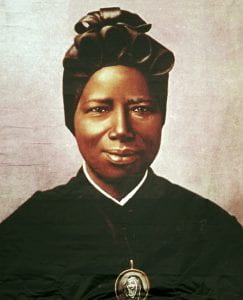 Today, February 8th, we celebrate the feast day of St. Josephine Bakhita, FDCC, a twentieth-century saint with ties to the spirit of the Vincentian family. Josephine was canonized in 2000, and we still have much to learn about her life.
Today, February 8th, we celebrate the feast day of St. Josephine Bakhita, FDCC, a twentieth-century saint with ties to the spirit of the Vincentian family. Josephine was canonized in 2000, and we still have much to learn about her life.
Born in Sudan in 1869, Josephine was kidnapped and enslaved as a young child. After being sold numerous times, she was trafficked to Italy, where she worked as a caregiver for a family’s young child. The child attended a school run by the Canossian Daughters of Charity, and it was here that Josephine claimed her self-agency. She took her case to court and, with the support of the Daughters, advocated for her own freedom. In 1896, she took vows and became a Canossian Daughter of Charity.1
Unlike many of our own Vincentian family members, Josephine’s pivotal moment of awakening was not growing aware of the hardships of those on the margins. Rather, Josephine became aware of her own power and the strength of her own voice.
Josephine is the patron saint of both Sudan and of the survivors of human trafficking. Her feast day marks the International Day of Prayer and Awareness against Human Trafficking. In a world wherein markets depend on exploitation, modern day slavery, and prison labor, Josephine’s story reminds us that we are an interconnected, global human family. As consumers, the decisions we make impact the lives of our kin around the globe. Josephine calls us to see those relationships with her words, “We must love everyone…we must be compassionate!”2
By shopping second-hand, by prioritizing Fair Trade and ethically sourced goods, and by demanding corporate responsibility, each of us can take small steps toward ending modern day slavery. As we celebrate Josephine’s feast day, take a moment to reflect on the ways you feel called to honor her story.
- What is one way you can commit to material simplicity and solidarity in the week ahead?
- What is one step you can take to become more aware of human trafficking in our world today?
- How can you use your voice to advocate for change and defend human dignity?
1 The Canossian Daughters of Charity, also called Daughters of Charity, Servants of the Poor, were founded in 1808 at Verona, Italy, by Saint Maddalena Gabriella di Canossa (1774-1835, canonized 1988). Their work was centered on Christian doctrine and in the care of poor children, in hospitals, and in education. Canossa was familiar with the Vincentian spirit and had planned to found this institute in collaboration with a Lady of Charity, who changed her mind and abandoned the project. The mission of this institute is to serve the poor. Other communities evolved from its foundation include the Institute of the Holy Family of Leopoldina Naudet; the Minims of Charity of Mary the Most Sorrowful Mother of Teodora Campestrini; the Sisters of the Most Precious Blood of Maria Bucchi; and the Daughters of the Church of Oliva Bonaldo. Generalate: Via della Stazione di Ottavia, 70; 00135 Rome, Italy.
See also, Betty Ann McNeil, D.C., The Vincentian Family Tree: A Genealogical Study (V.S.I., 1996), p. 25, n. 25. Online at: https://via.library.depaul.edu/vincentian_ebooks/6
2 Quote drawn from a webpage celebrating the life of Sr. Josephine, and sponsored by the Canossian Daughters of Charity: http://www.bakhita.fdcc.org/eng/bakhita-s-sayings.html
Reflection by: Emily LaHood-Olsen, Ministry Coordinator for Service Immersions, Division of Mission and Ministry